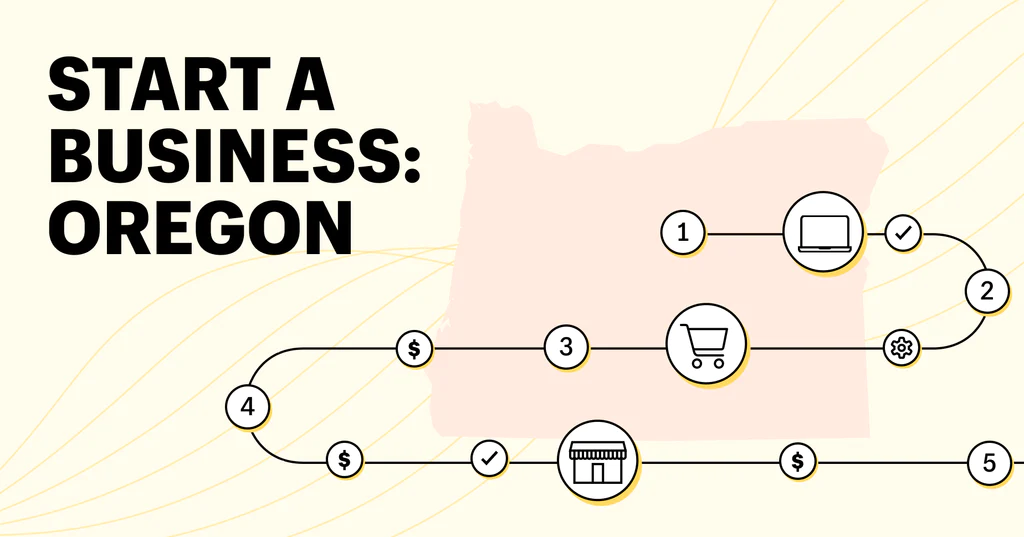A Comprehensive Guide on How to Start a Business in Oregon
Regarding how to start a business in Oregon, starting a business in Oregon offers a wealth of opportunities and a supportive environment for entrepreneurial growth. By following these essential steps and considering the key factors discussed in this guide, you can lay a strong foundation for your business venture. Remember to conduct thorough research, seek expert advice when needed, and remain adaptable in the face of challenges and opportunities.
With dedication, determination, and a well-executed plan, you can embark on a successful entrepreneurial journey in the beautiful state of Oregon. This article will guide you through the essential steps and key considerations to start a business in Oregon successfully.
Develop a Solid Business Idea: The first step in starting a business is to develop a solid business idea. Identify your passion, skills, and expertise and determine how they align with market demands.
Conduct market research to evaluate the feasibility of your business concept and identify your target audience. This research will also help you understand your competition, pricing strategies, and potential challenges.
Write a Business Plan: A well-crafted business plan serves as a roadmap for your entrepreneurial journey. It outlines your goals, target market, financial projections, marketing strategies, and operational plans.
A comprehensive business plan not only helps you clarify your vision but also serves as a crucial document when seeking funding from investors or financial institutions.
Choose a Legal Structure: Decide on the legal structure for your business. Common options include sole proprietorship, partnership, limited liability company (LLC), and corporation.
Each structure has its own advantages and disadvantages in terms of taxation, liability, and management. Consult with an attorney or a business advisor to understand the legal implications and choose the structure that best suits your business goals.
Register Your Business: To operate legally in Oregon, you must register your business with the appropriate government agencies. Start by choosing a unique business name and conducting a search on the Oregon Secretary of State’s website to ensure its availability.
Register your business entity and obtain the necessary permits and licenses for your specific industry. For detailed information, visit the Oregon Business Xpress website (www.oregon.gov/business).
Secure Financing: Consider your financial needs and explore various options to secure funding for your business. This could include personal savings, loans from family and friends, traditional bank loans, government grants, or venture capital.
Research local and state-specific programs, such as the Oregon Business Development Fund or the Oregon Credit Enhancement Fund, which provide financial assistance to small businesses.
Set Up Your Business Operations: Find a suitable location for your business operations. Whether it’s a physical storefront, office space, or a home-based business, ensure it complies with zoning regulations and other local ordinances. Set up necessary utilities, establish a business bank account, and obtain any required insurance coverage to protect your business.
Build a Professional Network: Networking plays a crucial role in the success of any business. Join industry-specific associations, attend local business events, and connect with fellow entrepreneurs to expand your professional network.
Oregon offers a vibrant entrepreneurial community, and participating in networking opportunities can provide valuable insights, potential partnerships, and mentorship.
Develop a Marketing Strategy: Create a robust marketing strategy to promote your business and attract customers. Utilize digital marketing tools, such as a professional website, social media platforms, and search engine optimization (SEO), to enhance your online presence.
Consider traditional marketing methods, such as print advertisements or local events, depending on your target market. Engage with your audience, build brand awareness, and establish a strong online reputation.
Hire Employees and Seek Expertise: As your business grows, you may need to hire employees to assist with operations. Understand your legal obligations as an employer and comply with state and federal employment laws. Consider seeking professional expertise in areas such as accounting, legal services, or marketing to ensure your business runs smoothly.
Stay Informed and Adapt: Lastly, keep yourself updated with the latest trends, regulations, and market conditions. Staying informed and adapting to changes are crucial for the long-term success of your business. Keep an eye on industry publications, attend conferences, and join relevant professional associations to stay abreast of the latest developments.
Additionally, monitor changes in local, state, and federal regulations that may impact your business operations, tax obligations, or licensing requirements.
Starting a business can be an exciting and rewarding venture, and if you’re considering establishing one in the beautiful state of Oregon, you’re in for a treat. With its thriving economy, supportive entrepreneurial ecosystem, and natural beauty, Oregon offers ample opportunities for new ventures to flourish.
Read Also: Books on How to Start a Business: Your Ultimate Guide to Success
Oregon Business Permit

Starting a business in Oregon requires careful consideration and adherence to various legal requirements. One crucial aspect is obtaining the necessary permits and licenses to ensure compliance with state and local regulations.
Understanding the permit landscape in Oregon can be a complex endeavor for aspiring entrepreneurs. In this article, we will provide a comprehensive guide to Oregon business permits, shedding light on the key permits required and the steps involved in obtaining them.
Oregon Business Registry: Before diving into the specifics of permits, it is important to note that all businesses operating in Oregon must first register with the Oregon Secretary of State. This process establishes the legal entity and ensures compliance with state tax obligations.
General Business Licenses: While Oregon does not have a statewide general business license, some cities and counties may require one. It is essential to check with the local city or county government where your business is located to determine if a general business license is necessary.
Professional and Occupational Licenses: Certain professions and occupations in Oregon require specialized licenses. These licenses ensure that professionals possess the necessary qualifications and expertise to operate in their respective fields.
Examples include real estate agents, contractors, architects, accountants, and healthcare professionals. Depending on your business’s nature, it is crucial to research and identify the specific professional or occupational licenses required.
Regulatory Permits: Many businesses in Oregon are subject to industry-specific regulations and permits. These permits aim to protect public health, safety, and the environment. Industries such as food service, manufacturing, construction, transportation, and childcare often require regulatory permits.
Research and consult with the appropriate state agencies or local authorities to determine the specific permits needed for your business.
Environmental Permits: Oregon has a strong commitment to environmental conservation, and businesses that have the potential to impact the environment must obtain environmental permits.
These permits cover various areas such as air quality, water quality, hazardous waste management, and stormwater runoff. Depending on the nature of your business activities, you may need to apply for permits from the Oregon Department of Environmental Quality (DEQ) or other relevant agencies.
Building and Zoning Permits: If your business involves construction, renovation, or change of use of a physical space, you will likely need building and zoning permits. These permits ensure that your business location complies with local building codes, fire safety regulations, and zoning restrictions. Contact the local building department or planning office to obtain the necessary permits and ensure compliance.
Liquor and Cannabis Licensing: Businesses involved in the sale, production, or distribution of alcoholic beverages or cannabis must obtain specific licenses from the Oregon Liquor Control Commission (OLCC). These licenses require strict adherence to state regulations and involve thorough background checks and compliance with operational guidelines.
Whether you are opening a bar, restaurant, or cannabis dispensary, familiarize yourself with the requirements and application process established by the OLCC.
Online and Home-Based Businesses: Even if your business operates primarily online or from your home, you may still be required to obtain certain permits. Home-based businesses must comply with zoning regulations and potentially apply for home occupation permits.
Online businesses, particularly those involved in e-commerce, should also be aware of sales tax requirements and consider registering for a seller’s permit with the Oregon Department of Revenue.
Navigating the landscape of business permits in Oregon can be intricate, but it is an essential step toward operating a legally compliant business. Understanding the various permits and licenses applicable to your industry is crucial for avoiding penalties and ensuring the smooth operation of your enterprise.
Remember to thoroughly research the specific requirements, consult with relevant agencies, and allocate sufficient time for the permit application process. By doing so, you can establish a solid foundation for your business and focus on its growth and success in the vibrant Oregon business environment. While the process may seem daunting, numerous resources are available to assist you in obtaining the necessary permits.
Oregon Business Plan
Oregon Business Plan serves as a testament to the state’s commitment to sustainable and inclusive economic growth. By prioritizing innovation, sustainability, workforce development, infrastructure investment, and regional collaboration, Oregon has created a business environment that fosters entrepreneurship, job creation, and industry diversification.
As the state continues to implement and refine its business plan, it remains well-positioned to overcome future challenges, adapt to evolving market trends, and maintain its status as a vibrant hub of innovation and economic prosperity.
Embracing Innovation and Entrepreneurship: Oregon’s business plan prioritizes fostering innovation and entrepreneurship as key drivers of economic growth. The state’s commitment to research and development has created an ecosystem that encourages the formation and expansion of technology startups.
Organizations like the Oregon Innovation Council (Oregon InC) provide crucial support by facilitating collaboration between entrepreneurs, investors, and research institutions, leading to the development of groundbreaking technologies and fostering the growth of industries such as clean energy, advanced manufacturing, and healthcare.
Sustainable Resource Management: Oregon is renowned for its commitment to environmental stewardship. The Oregon Business Plan integrates sustainability into the fabric of its economic initiatives, promoting resource efficiency, renewable energy adoption, and responsible land and water management.
Through partnerships with private enterprises, government agencies, and community organizations, the state has successfully implemented programs that promote sustainable practices, ensuring the longevity of its natural resources while creating jobs and driving economic growth.
Workforce Development and Education: Recognizing that a skilled and adaptable workforce is essential for economic success, the Oregon Business Plan places a strong emphasis on education and workforce development.
Collaborations between businesses, educational institutions, and workforce development organizations have led to the establishment of training programs that align with industry needs. By fostering a pipeline of talent equipped with the skills necessary for emerging sectors, Oregon attracts investments and cultivates a thriving business climate.
Infrastructure Investment: Infrastructure plays a vital role in supporting economic growth, and the Oregon Business Plan acknowledges this by emphasizing strategic investments in transportation, energy, broadband connectivity, and other critical infrastructure sectors.
By upgrading existing infrastructure and developing new projects, the plan aims to enhance Oregon’s connectivity, increase efficiency, and enable businesses to expand their operations effectively.
Regional Collaboration: The Oregon Business Plan promotes regional collaboration, recognizing that the success of one region can positively impact the entire state. By fostering partnerships between urban and rural areas, the plan aims to create an inclusive and equitable economy, ensuring that the benefits of growth are shared across communities.
This approach encourages innovation and investment in areas that have historically been underserved, revitalizing local economies and enhancing the overall economic resilience of the state.
As one of the most economically vibrant states in the United States, Oregon has long been recognized for its innovative spirit, thriving business ecosystem, and commitment to sustainability. The Oregon Business Plan serves as a comprehensive roadmap for sustainable economic growth, focusing on key areas such as job creation, innovation, education, and infrastructure development.
Oregon Business Name Registration
Registering your business name in Oregon is a crucial step in establishing your business identity and complying with state requirements. By following the outlined steps, conducting thorough research, and seeking professional advice when needed, you can ensure a smooth registration process and set your business on the path to success.
Remember, attention to detail and compliance with legal obligations are essential as you embark on your entrepreneurial journey.
Choosing a Business Name: Before diving into the registration process, it’s important to choose a unique and memorable name for your business. Consider the nature of your business, your target audience, and the message you want to convey. Ensure the name is not already in use by another business in Oregon and avoid any names that may infringe on trademarks.
Conducting a Name Search: Once you have a name in mind, conduct a thorough search to ensure its availability. The Oregon Secretary of State’s website provides a Business Name Search tool that allows you to check if the name is already registered or reserved by another entity. This step is crucial as the state requires your business name to be unique.
Legal Structure: Determine the legal structure for your business before proceeding with the registration. Common options include sole proprietorship, partnership, limited liability company (LLC), or corporation. Each structure has its own advantages and disadvantages, so consult with a legal or tax professional to decide which is best suited for your business.
Registering Your Business Name: To register your business name in Oregon, you need to file an application with the Oregon Secretary of State. The application can be completed online through the Oregon Business Registry website or submitted by mail. Provide accurate information, including your chosen business name, legal structure, and the names and addresses of all owners or officers.
Oregon Business Registry: The Oregon Business Registry consolidates various registrations and licenses required by the state. When registering your business name, you will automatically be registered with the Oregon Business Registry.
This simplifies the process and allows you to handle multiple registrations simultaneously, such as obtaining a state tax ID number or registering for state taxes.
Trade Names and Trademarks: If you plan to conduct your business under a name different from your registered business name, you must file a Trade Name Registration with the Oregon Secretary of State. This allows you to operate using a “doing business as” (DBA) name, commonly known as a trade name.
Additionally, if you wish to protect your business name, logo, or slogan, consider applying for trademark registration through the United States Patent and Trademark Office (USPTO).
Business Licenses and Permits: Depending on the nature of your business, you may need to obtain specific licenses and permits to operate legally in Oregon. The Oregon Secretary of State’s website provides information on state agencies and local jurisdictions where you can find details about the necessary permits for your industry.
Ongoing Compliance: After registering your business name, it’s essential to maintain ongoing compliance with state requirements. This includes renewing your business name registration periodically, typically every two years for most entities.
Stay informed about changes in regulations and promptly update your information with the Oregon Secretary of State whenever necessary.
Starting a new business can be an exciting endeavor, but it also requires careful planning and attention to detail. One crucial step in establishing your business identity is registering your business name.
Read Also: A Comprehensive Guide on Starting a Business in Georgia
Oregon Business Development

Oregon’s business development efforts have positioned the state as a vibrant hub for innovation and economic growth. With its favorable business environment, emphasis on entrepreneurship and innovation, strategic investments in key industries, and collaborative approach to economic development, Oregon continues to attract businesses from diverse sectors.
As the state embraces sustainable practices and supports small businesses, it remains at the forefront of economic advancement, cementing its status as a beacon of opportunity on the West Coast.
A Favorable Business Environment: Oregon’s business-friendly environment plays a pivotal role in its economic success. The state boasts a favorable tax structure, including absence of sales tax, which acts as a significant incentive for businesses. This advantage, coupled with a highly skilled workforce, enables entrepreneurs and corporations to establish and grow their operations with relative ease.
Furthermore, the state government actively supports small and medium-sized enterprises (SMEs) by offering various grants, loans, and tax credits to foster business development.
Entrepreneurial Culture and Innovation: Oregon’s entrepreneurial culture and emphasis on innovation have been instrumental in attracting startups and fostering their growth. The state is home to a strong network of incubators, accelerators, and co-working spaces that provide entrepreneurs with resources, mentorship, and networking opportunities.
These initiatives cultivate a supportive ecosystem, where startups can thrive and collaborate with like-minded individuals.
Oregon’s universities also play a vital role in driving innovation. Institutions such as Oregon State University and the University of Oregon are renowned for their research and development programs, providing a steady stream of talent and ideas to the business community.
Additionally, partnerships between academia and industry foster collaboration, leading to the commercialization of groundbreaking technologies.
Strategic Investment in Key Industries: Oregon has strategically invested in key industries to diversify its economy and promote sustainable growth. The state has become a global leader in clean technology and renewable energy, attracting companies focused on solar, wind, and wave power.
Oregon’s commitment to sustainability aligns with the increasing demand for eco-friendly solutions, driving innovation and economic opportunities in the green sector.
The state’s robust manufacturing sector is another pillar of Oregon’s economic development. From semiconductors to aerospace and advanced materials, Oregon’s manufacturing capabilities are highly regarded.
The presence of industry giants like Intel and Nike, as well as a network of specialized supply chains and manufacturing hubs, further enhance the state’s reputation as a manufacturing powerhouse.
Collaborative Approach to Economic Development: Oregon’s approach to economic development is characterized by collaboration between the public and private sectors. Organizations such as Business Oregon, the state’s economic development agency, work closely with businesses to provide resources, expertise, and support.
Business Oregon offers a range of services, including financing options, workforce development programs, and international trade assistance, to help businesses thrive and expand.
In addition, various industry-specific associations and clusters facilitate knowledge sharing and collaboration within sectors. These organizations promote innovation, offer networking opportunities, and advocate for the interests of their respective industries.
By fostering collaboration and partnerships, Oregon creates an environment conducive to growth and economic resilience.
Oregon, known for its picturesque landscapes, vibrant cities, and progressive policies, has emerged as a hotbed for business development and innovation. With a robust entrepreneurial ecosystem, strategic investments, and a commitment to sustainability, the state has been successful in attracting and nurturing a diverse range of industries.
Read Also: How to Grow Wheat – Beginners Guide




